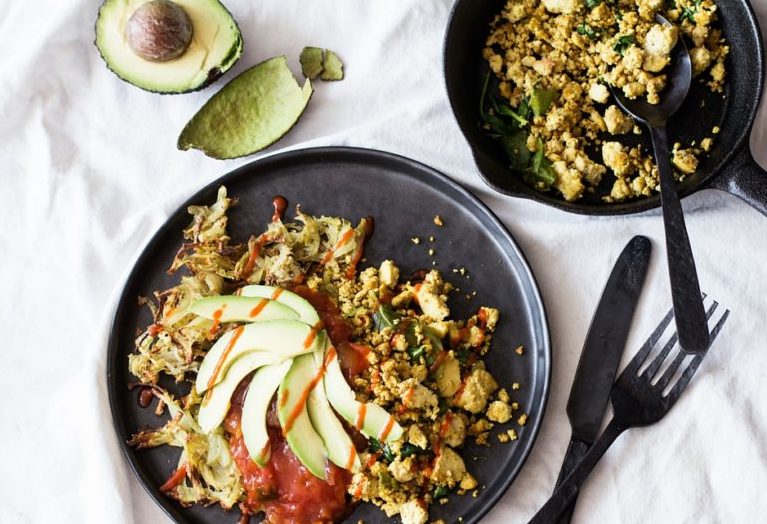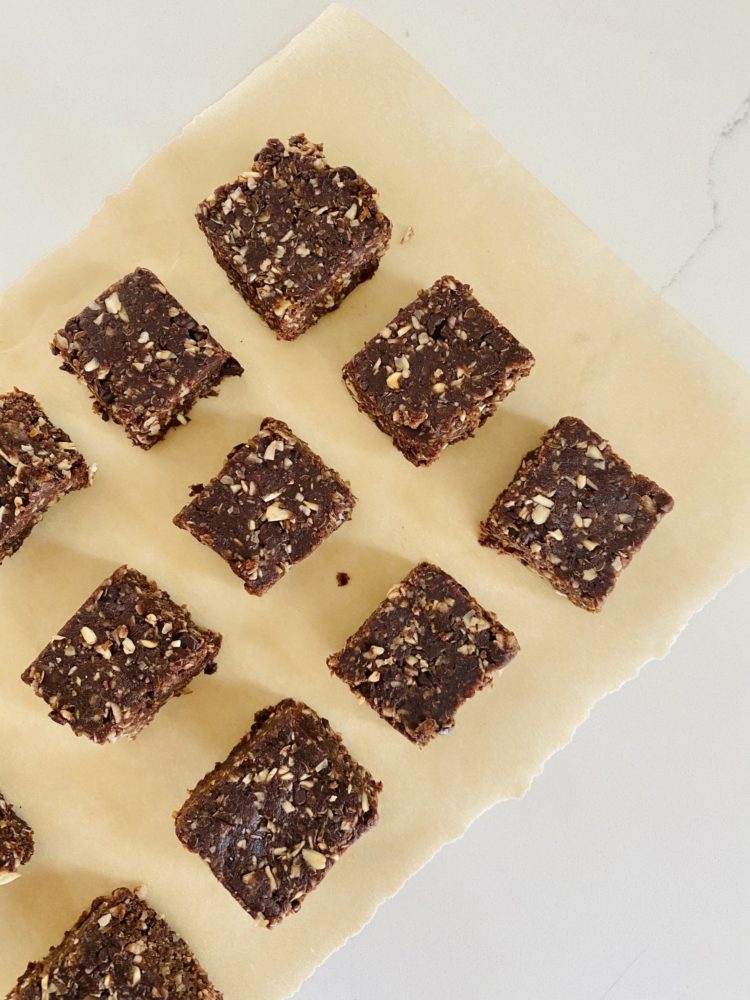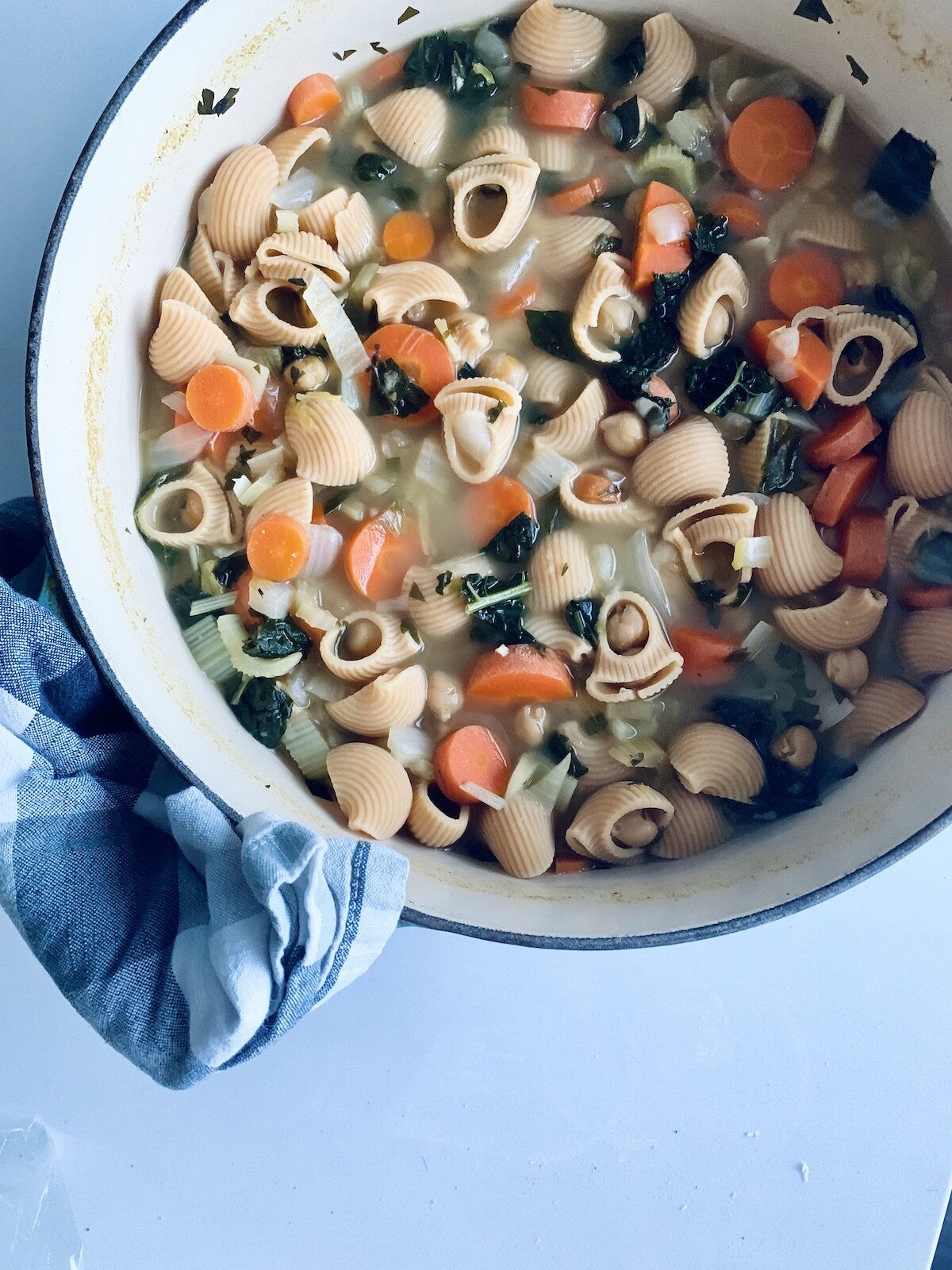Many clients come to me assuming I’m going to tell them to eat less. They think their sluggishness is the result of eating too many “heavy” foods, or their unsuccessful weight loss is from too much overeating. As women, we are inundated with fear-based messages about obesity and overeating. We’re taught overtly and covertly to stay small, look small, eat small. So, women are shocked when I don’t tell them to eat less. And they are even more shocked when I tell them the opposite – that they are not eating enough. Not eating enough can cause all sorts of health problems, both physically and mentally, and some of those signs can be pretty easy to miss. You might feel constantly tired or have sudden mood swings—those could be signs your body is trying to tell you it’s not getting what it needs. In this article, we’re diving in to 11 surprising signs that you might not be eating enough. Plus, I’ll give you a few ways to start nourishing yourself better today.

How much “should” you be eating?
you might wonder how to know how much you “should” eat. The most basic way to think about this is daily calorie intake. You’ll find many resources online for calculating your daily calorie intake based on factors like age, gender, height, body weight, and activity level, but it’s essential to remember that health and well-being encompass more than just a simplistic “calories in, calories out” formula. Not to mention, calorie counting can feel really inconvenient and can be a catalyst for an unhealthy relationship with food.
If you decide it would be helpful to understand your general caloric needs (and you know you’re capable of holding this information very loosely), start with an online calculator as a baseline. These tools can provide a general estimate based on your individual characteristics and activity levels. However, it’s crucial to recognize that these numbers are not set in stone. Your caloric needs can fluctuate daily due to various factors, including exercise intensity, stress levels, and even hormonal changes.
As a dietitian and intuitive eating counselor, I actually don’t recommend counting calories. instead, consider exploring the principles of intuitive eating. Intuitive eating teaches you to listen to your body rather than adhering to external rules like daily calorie intake. By tuning in to your hunger and fullness cues, you can develop a more holistic understanding of what your body truly needs. It also help you get in touch with what satisfies you. This approach cultivates a healthier relationship with food and helps you focus on nourishing your body with wholesome, nutrient-dense foods, rather than getting caught up in the anxiety of calorie counting. This is not to say that nutrition is thrown out the window. Intuitive eating also teaches something called “gentle nutrition“, which helps you navigate giving your body the calories and nutrients it needs in a way that doesn’t include diet mentality or restrictive diets. It can help you learn how to eat enough without over- or under-eating.
Health Risks of Not Eating Enough
Not eating enough comes with its own health risks. Here are a few of the negative impacts associated with underfeeding your body:
- Chronic Fatigue: Persistent tiredness and lack of energy, making daily activities difficult.
- Nutritional Deficiencies: Insufficient intake of essential vitamins and minerals, leading to various health issues.
- Hormonal Imbalances: Disruption of hormone production, potentially leading to issues such as irregular menstrual cycles and infertility.
- Hypoglycemia: Low blood sugar levels causing symptoms like shakiness, anxiety, dizziness, and confusion.
- Weakened Immune System: Increased susceptibility to infections and illnesses due to a lack of nutrients.
- Muscle Loss: Decreased muscle mass and strength as the body breaks down muscle for energy.
- Bone Density Loss: Increased risk of osteoporosis and fractures because of inadequate calcium and vitamin D.
- Mood Changes: Heightened anxiety, irritability, and depressive symptoms linked to inadequate nutrition.
- Gastrointestinal Problems: Issues such as constipation and bloating due to insufficient fiber intake.
- Cognitive Decline: Impaired concentration and memory functions as a result of inadequate caloric intake.
- Skin Issues: Dry skin, hair loss, and other dermatological problems due to nutrient deficiencies.
- Heart Health Risks: Potential for heart problems due to imbalanced electrolytes and reduced heart muscle mass.
- Disordered Eating Patterns: Increased likelihood of developing eating disorders or unhealthy relationships with food.
- Increased Stress Levels: Heightened stress response due to energy deprivation impacting overall well-being.
Why plant-based women are at risk of not eating enough
Plant-based women might face a higher risk of not eating enough for a few reasons. While plant-based foods are very nutrient-dense and filling, they can also be low in calories. This is often framed as a benefit – more nutrition, more fullness, fewer calories. But for some women, this is a recipe for under-eating. To counteract this, make sure you’re including plenty of plant-based fats in your meals.
Like broader diet culture, plant-based diet culture frequently encourages practices like limiting high-fat foods, intermittent fasting, and prioritizing low-calorie foods. All of these practices can contribute to not eating enough.
11 Signs You Might Not Be Eating Enough
You’re fasting, very low-fat, or following another restrictive plant-based diet
As I mentioned above, these practices are a unique risk for plant-based women. In the case of fasting, you’re limiting your eating window and therefore potentially limiting your calorie intake. With plant-based diets that limit fat, your intake shifts to foods that are high in fiber (filling), but low in calories, making it harder to eat enough. Following one of these diets doesn’t guarantee that you’ll under-eat, but it does put you at higher risk.
You have nutrient deficiencies
If you don’t eat enough, you’re likely to experience nutrient deficiencies because inadequate caloric intake often means you’re not consuming a sufficient variety of nutrient-dense foods. When your diet lacks variety and quantity, you may miss out on essential vitamins and minerals necessary for overall health.
You constantly feel hungry or constantly think about food
If you don’t eat enough, it’s common to find yourself preoccupied with food, as your body enters a state of heightened alertness in response to perceived famine. When you restrict your caloric intake, your brain and body become fixated on the idea of food, driven by the instinctual need to survive. This common sign over under-eating can manifest as constant thoughts about meals, cravings for specific foods, or even dreams about eating, making it difficult to focus on other aspects of life. The underlying biological response is a survival mechanism; your body doesn’t recognize that the famine is self-imposed, leading to an overwhelming preoccupation with food as it seeks to ensure its energy needs are met. Additionally, inadequate nutrition disrupts the balance of neurotransmitters responsible for mood regulation, exacerbating feelings of irritability and emotional instability—further diverting attention to food as a potential source of comfort or satisfaction.
You often forget to eat or skip meals
Inconsistent food intake can put you at risk of not eating enough due to the resulting imbalance in your body’s energy and nutrient intake. When you skip a meal, especially breakfast or if you go too long between meals, your body may not receive the essential calories and nutrients it needs to function optimally. This can lead to symptoms such as fatigue, dizziness, and difficulty concentrating, as your blood sugar levels drop and your body begins to signal for nourishment. Additionally, missing meals can trigger intense cravings later, often leading to overeating or poor food choices that lack the necessary nutrients.
You eat a limited number of foods
Limited food choices can lead to insufficient caloric intake and nutrient deficiencies, as it becomes challenging to meet your body’s energy and nutritional needs with a narrow selection of foods. This limitation can stem from personal preferences, dietary restrictions, or the desire to adhere to specific dietary trends, such as the Paleo diet. Consequently, without eating a balanced diet that incorporates a wider range of foods that provide essential vitamins, minerals, and macronutrients, you may inadvertently consume fewer calories than necessary.
You feel low energy or moody
If you don’t eat enough, you may experience low energy and mood swings due to inadequate calorie intake and nutrient deficiencies. When the body is deprived of essential fuel, it struggles to function properly, leading to symptoms such as irritability, anxiety, and fatigue. Research indicates that extreme calorie restriction can negatively impact mental health, contributing to feelings of frustration and confusion. Additionally, low energy levels can trigger a cycle of moodiness and increased cravings for quick-fix sugary foods, which can consequently cause fluctuations in blood sugar levels, further exacerbating feelings of irritability and exhaustion.
You have irregular menstrual cycles
Irregular menstrual cycles can often be attributed to inadequate calorie intake, as insufficient nutrition disrupts the delicate hormonal balance necessary for regular ovulation. When women do not consume enough calories, their bodies can respond by halting ovulation altogether, leading to a condition known as amenorrhea. This absence of menstruation occurs because the body, in an effort to conserve energy, prioritizes essential functions over reproductive health. Low body fat and nutrient deficiencies further exacerbate this issue, as they can impact the hypothalamic-pituitary axis, which regulates hormonal signals crucial for maintaining a regular menstrual cycle. As a result, a lack of proper nourishment can create a cycle of hormonal imbalances, ultimately affecting fertility and overall well-being.
You have other hormone imbalances
If you don’t eat enough, you may experience hormone imbalances due to the intricate relationship between your body’s nutritional intake and hormonal regulation. The hypothalamus and pituitary gland, which are crucial for maintaining hormonal balance, rely on adequate calorie and nutrient intake to function properly. When calorie consumption drops too low, these brain structures receive altered signals, disrupting the production and regulation of key hormones such as estrogen and progesterone. This imbalance can interfere with reproductive health, leading to issues such as missed periods or infertility. Additionally, insufficient nutrition can impact hormones that regulate appetite and stress, exacerbating feelings of hunger and mood disturbances, which further perpetuates a cycle of poor dietary habits and hormonal irregularities. Thus, inadequate caloric intake not only affects physical health but also has profound implications for hormonal balance and overall well-being.
Exercise feels hard and recovery is slow
Exercise can feel exceptionally challenging when you haven’t eaten enough because your body lacks the necessary fuel to perform optimally. When caloric intake is insufficient, your energy reserves become depleted, leaving your muscles without the glucose they need for contraction and endurance. This can result in feelings of fatigue and weakness, making even simple physical activities feel like monumental tasks. Additionally, inadequate nutrition can disrupt essential bodily functions, leading to decreased stamina and impaired recovery, further compounding the struggle during workouts. As a result, not only does your physical performance suffer, but your mental resilience can also be tested, as the lack of energy can contribute to feelings of frustration and discouragement when attempting to engage in exercise. Ultimately, the combination of low energy levels and diminished physiological support makes exercising feel much harder than it should.
You get sick often
If you’re not eating enough, your body may lack the essential nutrients it needs to maintain a strong immune system, making you more susceptible to frequent illnesses. Insufficient calorie intake can lead to nutrient deficiencies, particularly in vitamins and minerals that are crucial for immune function, such as vitamin C, vitamin D, and zinc. When your body is deprived of these vital nutrients, it struggles to produce the necessary immune cells and antibodies required to fend off infections, leaving you vulnerable to colds, flu, and other illnesses. Additionally, inadequate nutrition can result in chronic fatigue, further diminishing your body’s ability to combat pathogens. Ultimately, consistently under-eating can create a vicious cycle where your weakened immune system leads to more frequent sickness, prompting the need for a reassessment of your dietary habits.
Hair, skin, and nail issues
If you’re not consuming enough calories or essential nutrients, you may experience significant issues with your hair, skin, and nails due to the body’s prioritization of energy allocation. When caloric intake is inadequate, the body directs nutrients to support critical organs such as the brain, heart, and lungs, leaving your hair, skin, and nails to suffer from a lack of vital resources. This can lead to hair loss, brittle nails, and dull skin, as these components rely heavily on a balanced intake of vitamins and minerals, including B-vitamins, omega-3 fatty acids, and antioxidants for optimal health. Consequently, the absence of these nutrients can result in weakened keratin production, leading to thinning hair and breakage of nails, while the overall appearance of your skin may become lackluster. Thus, it is crucial to nourish your body adequately to maintain the health and vitality of your hair, skin, and nails.
How to start nourishing yourself better today
Ditch dieting
Letting go of restrictive dieting can be a game-changer for anyone looking to break free from the cycle of under-eating and take charge of their health. It’s easy to get caught up in a mindset that emphasizes calorie counting and strict food rules, but this can lead to not getting enough nutrients and can cause various physical and emotional challenges like fatigue, digestive issues, and irritability. By moving away from the dieting mentality, you can shift your focus towards nourishing your body with a well-rounded mix of foods. This not only boosts your energy levels but also enhances your overall well-being. Embracing a more intuitive eating approach—one that encourages you to tune into your body’s hunger signals and favor whole, nutrient-rich foods—can help you build a much healthier relationship with food. This positive change can help ease any worries about certain food groups and encourage mindful eating habits, making a real difference in your recovery, performance, and overall quality of life!
Reframe unhelpful beliefs
Transforming unhelpful beliefs can be a fantastic stepping stone in your journey to overcome under-eating. It gives you the chance to challenge and reshape those negative thoughts that often lead to restrictive eating habits. Many of us fall into the trap of misconceptions about food, body image, and weight, which can create an unhealthy relationship with what we eat. By spotting and addressing these limiting beliefs—like thinking that eating more will mean weight gain or labeling certain foods as ‘bad’—you can replace them with helpful, supportive thoughts. This not only nurtures a sense of self-compassion, but it also opens the door to enjoying a more diverse and pleasurable diet. Plus, it can really help ease any guilt or anxiety that comes with eating. When you begin to view food as not just fuel, but also as a delightful source of joy and connection, you empower yourself to nourish your body in a more intuitive way. This positive shift can help you break free from cycles of under-eating and lead to more peace with food.
Learn how to build balanced meals
Eating balanced meals is important for breaking the cycle of under-eating because it gives your body the greatest chance of getting the nourishment it needs. By mixing in a variety of food groups—like those delicious complex carbohydrates from whole grains, bright fruits, and colorful veggies, along with proteins from beans and legumes, plus healthy fats from nuts and seeds—you make sure your body receives the energy it needs, as well as the vitamins and minerals that keep you feeling well. This balanced way of eating can help ward off nutrient deficiencies that might lead to less appetite and more under-eating.
Prioritize eating meals and snacks everyday
Making it a habit to enjoy regular meals and snacks gives you a consistent intake of energy and nutrients. A consistent eating schedule can also help keep your blood sugar in check, which means you’ll feel less shaky or dizzy when you skip meals. Plus, eating regularly helps you stay in pleasant hunger and fullness without swinging into feeling starving or overly stuffed. By focusing on having balanced meals and snacks, you’ll not only feel more grounded but also create a lovely routine that helps you develop healthy eating habits—making it easier to tune into what your body needs and steer clear of under-eating.
You don’t have to do it alone! Get on the waitlist for the Plant-based Intuitive Eating Program for step-by-step support with nourishing yourself in a gentle, intuitive way.


